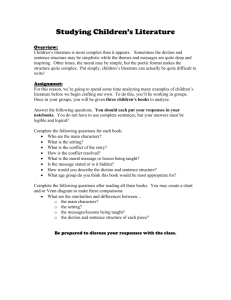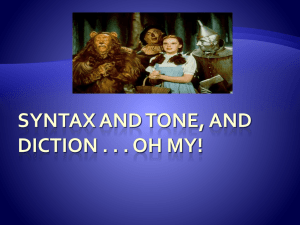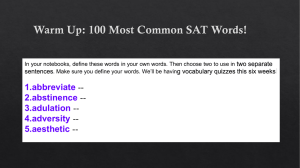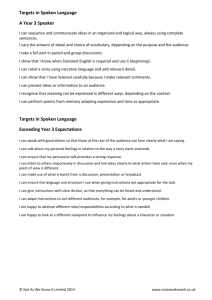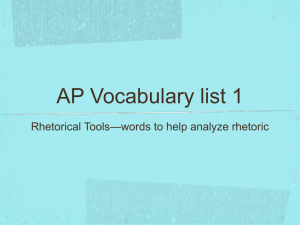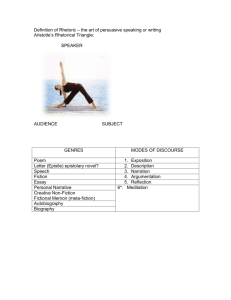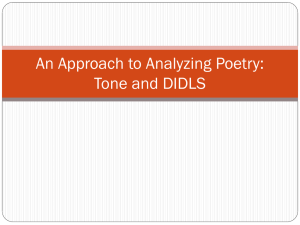Station: Diction Task: In this station, you will review the importance of
advertisement
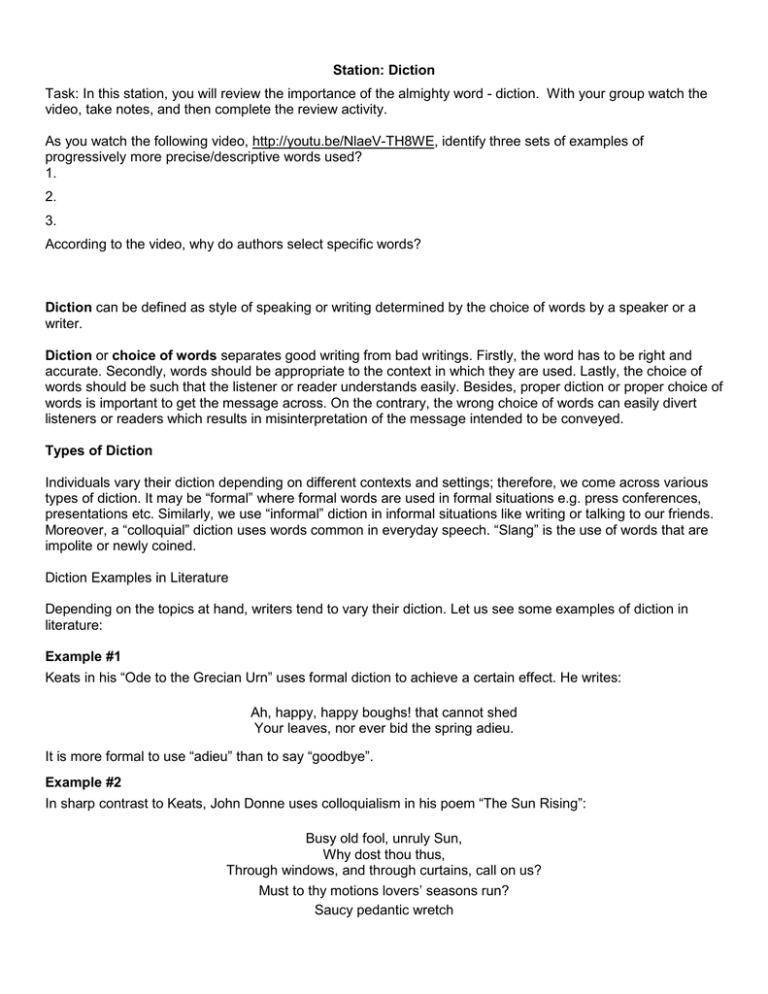
Station: Diction Task: In this station, you will review the importance of the almighty word - diction. With your group watch the video, take notes, and then complete the review activity. As you watch the following video, http://youtu.be/NlaeV-TH8WE, identify three sets of examples of progressively more precise/descriptive words used? 1. 2. 3. According to the video, why do authors select specific words? Diction can be defined as style of speaking or writing determined by the choice of words by a speaker or a writer. Diction or choice of words separates good writing from bad writings. Firstly, the word has to be right and accurate. Secondly, words should be appropriate to the context in which they are used. Lastly, the choice of words should be such that the listener or reader understands easily. Besides, proper diction or proper choice of words is important to get the message across. On the contrary, the wrong choice of words can easily divert listeners or readers which results in misinterpretation of the message intended to be conveyed. Types of Diction Individuals vary their diction depending on different contexts and settings; therefore, we come across various types of diction. It may be “formal” where formal words are used in formal situations e.g. press conferences, presentations etc. Similarly, we use “informal” diction in informal situations like writing or talking to our friends. Moreover, a “colloquial” diction uses words common in everyday speech. “Slang” is the use of words that are impolite or newly coined. Diction Examples in Literature Depending on the topics at hand, writers tend to vary their diction. Let us see some examples of diction in literature: Example #1 Keats in his “Ode to the Grecian Urn” uses formal diction to achieve a certain effect. He writes: Ah, happy, happy boughs! that cannot shed Your leaves, nor ever bid the spring adieu. It is more formal to use “adieu” than to say “goodbye”. Example #2 In sharp contrast to Keats, John Donne uses colloquialism in his poem “The Sun Rising”: Busy old fool, unruly Sun, Why dost thou thus, Through windows, and through curtains, call on us? Must to thy motions lovers’ seasons run? Saucy pedantic wretch Treating the sun as a real human being, the poet speaks to the sun in an informal way using colloquial expressions. Obviously, calling the sun a “wretch” is NOT formal. He rebukes the sun because the sun has appeared to spoil the good time he is having with his beloved. Example #3 Writers’ skillfully choose words to develop a certain tone and atmosphere in their works. Read the following excerpt from a short story “The School” by Donald Barthelme: And the trees all died. They were orange trees. I don’t know why they died, they just died. Something wrong with the soil possibly or maybe the stuff we got from the nursery wasn’t the best. We complained about it. So we’ve got thirty kids there, each kid had his or her own little tree to plant and we’ve got these thirty dead trees. All these kids looking at these little brown sticks, it was depressing. The use of the words “died”, “dead”, “brown sticks” and “depressing” gives a gloomy tone to the passage. Example #4 Sometimes writers repeat their chosen words or phrases to achieve an artistic effect. Read the following example from “ A Tale of Two Cities” by Charles Dickens: It was the best of times, it was the worst of times, it was the age of wisdom, it was the age of foolishness, it was the epoch of belief, it was the epoch of incredulity, it was the season of Light, it was the season of Darkness, it was the spring of hope, it was the winter of despair. By repeating the phrase “It was…” throughout the passage, the writer ensures that the readers will give more consideration to characteristic of the “age” they are going to read about in the novel. Function of Diction In literature, writers choose words to create and convey a typical mood, tone and atmosphere to their readers. A writer’s choice of words and his selection of graphic words not only affects the reader’s attitude but also conveys the writer’s feelings toward the literary work. You try! Choose a sentence from the bag. Without showing your group members, perform the sentence (like charades) using three different tones to convey the action. Each action must be MORE precise or descriptive than the one provided. Repeat until your group members perform all sentences. Example: She acknowledged the joke. (tone = ambiguous) She rolled her eyes at the joke. (tone = annoyed) She guffawed at the joke. (tone = sarcastic) She roared with laughter. (tone = humorous) 1) I walked in the house. 2) I ate dinner. 3) I danced. 4) I looked at the internet.
